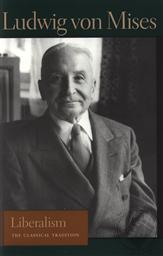Liberalism, The Classical Tradition (Book/ Paperback)
by Ludwig von MisesProduct Overview
Introduction to Liberalism by Ludwig von Mises
The philosophers, sociologists, and economists of the eighteenth and the early part of the nineteenth century formulated a political program that served as a guide to social policy first in England and the United States, then on the European continent, and finally in the other parts of the inhabited world as well. Nowhere was this program ever completely carried out. Even in England, which has been called the homeland of liberalism and the model liberal country, the proponents of liberal policies never succeeded in winning all their demands. In the rest of the world only parts of the liberal program were adopted, while others, no less important, were either rejected from the very first or discarded after a short time. Only with some exaggeration can one say that the world once lived through a liberal era. Liberalism was never permitted to come to full fruition.
Nevertheless, brief and all too limited as the supremacy of liberal ideas was, it sufficed to change the face of the earth. A magnificent economic development took place. The release of man's productive powers multiplied the means of subsistence many times over. On the eve of the World War (which was itself the result of a long and bitter struggle against the liberal spirit and which ushered in a period of still more bitter attacks on liberal principles), the world was incomparably more densely populated than it had ever been, and each inhabitant could live incomparably better than had been possible in earlier centuries. The prosperity that liberalism had created reduced considerably infant mortality, which had been the pitiless scourge of earlier ages, and, as a result of the improvement in living conditions, lengthened the average span of life.
Nor did this prosperity flow only to a select class of privileged persons. On the eve of the World War the worker in the industrial nations of Europe, in the United States, and in the overseas dominions of England lived better and more graciously than the nobleman of not too long before. Not only could he eat and drink according to his desire; he could give his children a better education; he could, if he wished, take part in the intellectual and cultural life of his nation; and, if he possessed enough talent and energy, he could, without difficulty, raise his social position. It was precisely in the countries that had gone the farthest in adopting the liberal program that the top of the social pyramid was composed, in the main, not of those who had, from their very birth, enjoyed a privileged position by virtue of the wealth or high rank of their parents, but of those who, under favorable conditions, had worked their way up from straitened circumstances by their own power. The barriers that had in earlier ages separated lords and serfs had fallen. Now there were only citizens with equal rights. No one was handicapped or persecuted on account of his nationality, his opinions, or his faith. Domestic Political and religious persecutions had ceased, and international wars began to become less frequent. Optimists were already hailing the dawn of the age of eternal peace.
But events have turned out otherwise. In the nineteenth century strong and violent opponents of liberalism sprang up who succeeded in wiping out a great part of what had been gained by the liberals. The world today wants to hear no more of liberalism. Outside England the term "liberalism" is frankly proscribed. In England, there are, to be sure, still "liberals," but most of them are so in name only. In fact, they are rather moderate socialists. Everywhere today political power is in the hands of the antiliberal parties. The program of antiliberalism unleashed the forces that gave rise to the great World War and, by virtue of import and export quotas, tariffs, migration barriers, and similar measures, has brought the nations of the world to the point of mutual isolation. Within each nation it has led to soci
About the Author(s)
Ludwig von Mises
Ludwig Heinrich Edler von Mises (1881-1973) was an Austrian economist, philosopher, and classical liberal who was a prominent figure in the Austrian School of economic thought. Fearing a Nazi take-over of Europe, Mises emigrated to New York in 1940. He published his magnum opus Human Action in 1949. Mises had a significant influence on the Libertarian movement that developed in the United States in the mid-20th century.
List Price: $14.50
Our Price: $12.00
You Save:
$2.50(17%)
+ Free Shipping w/ $45 min. purchase
Category: History
Format: Book (Paperback)
Publisher: Liberty Fund Inc
Date Published: Jan 01, 1985
Language: English
ISBN: 9780865975866
SKU: LT-328
Dimensions: 6.00 x 9.00 x 0.50 (in)
Weight: 12.40 oz










